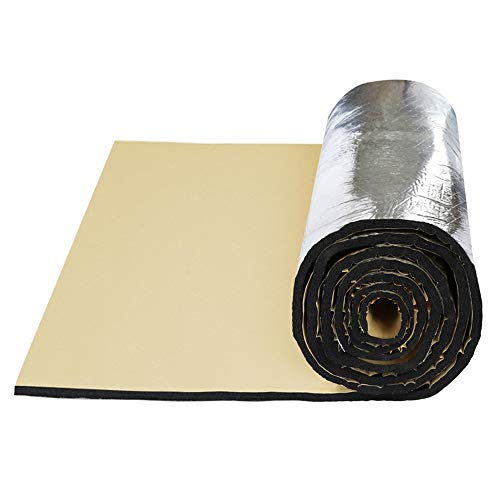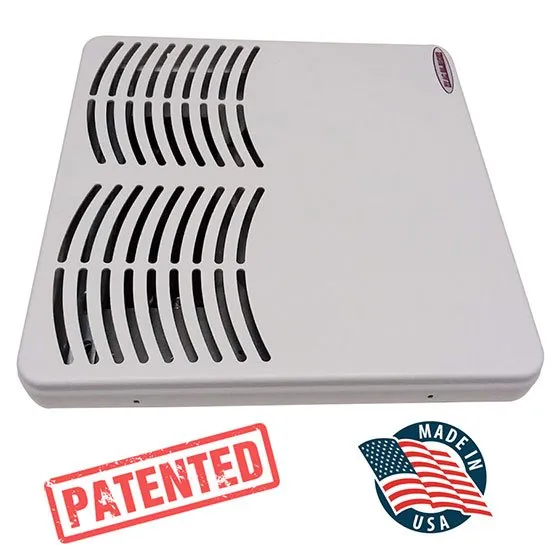Is your RV air conditioner too loud? It’s not uncommon for RV air conditioners to be noisy. Many RV AC units run so loudly that they can be heard outside of the RV! If this is happening in your RV, then you might want to consider a few things to quiet it down before getting it fixed.
This blog post will show you step-by-step ways to quiet that loud RV air conditioning unit. You will also learn about some of the reasons why an RV AC can be so noisy and how to fix this issue. If you are looking for ways to quiet your RV’s air conditioning unit, then keep reading!
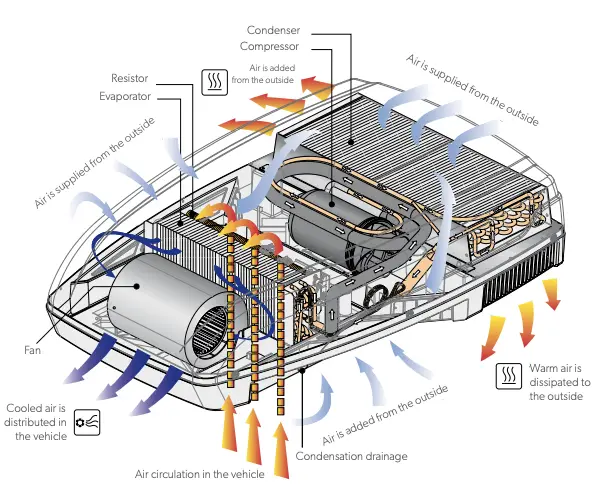
Check the Freon Levels in Your RV’s Air Conditioner
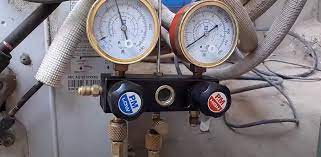
If your RV’s air conditioner has too much or too little freon, it can cause an unsettling, loud noise. This means it is time to call in a professional, as freon can be dangerous to work with. Keep yourself and your family safe by not trying to tackle this issue yourself.
RV air conditioning is a closed system. You can’t measure the freon level directly. In order to check the freon, you have to check things that indicate low freon.
The Air Conditioning Unit Isn’t Pulling the Right Amperage
To figure this out, you need to measure the amps being used for the compressor. If you are going to check this yourself, you’ll need an amp clamp, and you’ll need to know how many amps your AC unit should be pulling. If you don’t know, call the manufacturer and have your model number ready.
- Turn on the AC. Let it run for about 15 minutes before you test.
- Find the air compressor wire. It’s usually blue or purple. Check your manual if you don’t know.
- Set the amp clamp for the 40-amp scale. Let the compressor run a few minutes and then check the reading. It should be very close to the amps your unit is supposed to pull.
If the reading is low, this is your first clue that freon may be low.
Air Temperature Doesn’t Match at Intake and Exhaust
The next clue that your unit may be lacking freon is even easier to measure, as long as you have analog thermometers. The one you use for food or meat will do. You’ll need two of them.
- Put one at the intake and one at the exhaust. Let them sit there for about 10 minutes.
- The numbers should not be the same. If they are, that means the air going in isn’t getting cooled down at all because it’s coming out at or near the temperature where it started.
If the readouts are the same, or very close to being the same, you can assume your RV’s air conditioner has lost its freon. At this point, you need to call a technician unless you know how to recharge the freon yourself.
If the amps readout is correct for your make and model of the air conditioner and your temperature readouts are different, it is most likely not a freon problem.
Check for Loose Parts on the Air Conditioner Unit
Inspect the air conditioning unit for loose parts. Loose components can rattle in the machine and cause loud noises. If there are loose parts, it may be as simple as reattaching them properly.
The following are the different components to inspect on your RV’s air conditioner:
- Loose bolts – RV air conditioners are usually bolted to the metal framework that holds them, but sometimes these bolts can loosen over time after being subjected to so much vibration.
- Loose hoses or belts – Hoses or belts can make noise which only get worse as they wear out and come off their pulleys
- A vibrating cover – If the rubber gasket on the clamp holding the freon line is worn, the vibration it makes against the cover can make a loud buzz or hum. Replacing the rubber on the hose clamp might be a DIY job if you know your way around an air conditioner.
If you find that any of these issues are causing excessive noise, they are all fairly easy to get fixed.
Note: If you are going to perform the inspection yourself, use caution. Since many RV air conditioners are mounted on top of the vehicle, any work you do yourself should be done carefully and with someone else around.
Clean Out Your RV Air Conditioner’s Vents
With all that time out on the open road, moving from place to place, the air ducts inside your RV are more likely to be filled with dust and debris than the ones in your house. This makes it harder for air to move, thus defeating a purpose of an AC system and making it louder as well.
A dirty filter, like unclean ducts, will cause the air to move more slowly, and this will also make it louder. Cleaning your air filters can help to make a loud RV AC quieter too, but this will depend on how dirty they are. It is fairly simple to do, but you can also hire a service to do this.
How often you do this depends on how often you use your RV. You should be doing this every year, no matter what. But if you are traveling through dusty landscapes or moving around a lot, you may want to take care of this twice a year.
Add Insulation to Cut Down Noise from Vibration
The mat provides strong sound insulation and absorption performance, as well as heat insulation.
🌞 It helps block sunlight, engine and exhaust pipe heat from entering the car, reducing air conditioning energy consumption and saving fuel.
If there is a vibration that comes from anything touching any loose components like hoses or belts or just a noisy housing, then this may be causing a noise issue.
- Cover up all pipes and hoses so they do not rub against each other.
- Insulate the RV’s metal exterior where possible, such as around windows, can also reduce sound.
- Add soundproofing foam around pipes and hoses
- Cover up all wires that are near each other, so they do not rub against one another and create noise.
If you’re constantly hearing the loud, whirring fan of your RV, you may need to get some insulation installed. This will help reduce the noise that your RV makes from outside noises as well.
Inspect Your Air Conditioner’s Coils
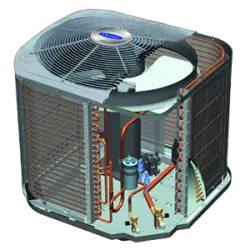
If the coils, for whatever reason, are broken or damaged in any way, then you will have a loud noise coming from it as well.
A simple solution may be to clean the condenser coil. Check for debris and clear it away if there is any. Keep the area around the condenser clean to avoid more loud noises in the future.
Make this part of your annual air conditioner cleaning and inspect everything at once, taking note of anything that needs repair or maintenance.
Look Over the Fan Motor
You may need to invest in a new fan motor, a faulty or broken motor can cause your RV air conditioner to run noisier than normal.
If your fan motor is making a buzzing or rattling sound and:
- You haven’t found any evidence of something loose or broken inside
- You know your unit is clean
- The blades seem to be running smoothly
Then it’s very likely that the fan motor itself may be to blame for the noise.
If the fan is loud and not working properly, then it should be replaced. A noisy AC unit might be making those noises because it is getting old, and in these cases, you may want to replace it altogether!
Check for Leaks, Inside and Outside
The last thing you can do is to check the air conditioner’s ducts, intake, and exhaust for leaks. A leak could be responsible for a noisy RV AC.
The following are some things you can do to fix a leaky air conditioner.
- Replace rubber cushioning – The rubber cushioning under the RV air conditioner should also be replaced to make it quieter.
- Check the drip tray – It may simply be that the drip tray is not draining correctly. By removing the shroud and some of the AC housing, you can access the drip tray and clean it out.
- Check the drain pipe for a clog – If the drain pipe is clogged with dust, debris, and dirt, the evaporated water can’t get out toward the roof and will leak back out into the drain pan/drip tray.
These are just a few of the many reasons why your RV might be loud when the AC is on, but luckily there are some easy fixes you can try first before calling in an expert! If the noise is still bothering you after you tried some of the fixes above, you may want to invest in a silencer.
We still have a few more ways for you to reduce the noise level from your air conditioner so you can enjoy van life more!
Reducing Noise Due to the Cover or Shroud
Tired of that flapping sound of the AV cover when you’re driving around? Like anything on top of your RV, that cover can make some noise if it’s not tightened down. You should cover your AC when not in use, so make sure you have a cover that fits like a glove. Covers are made from weatherproof fabric, hard plastic, or soft vinyl.
Dometic 3309518.003 Brisk Replacement is designed to replace the upper unit shroud on Brisk models. The shroud is polar white with a gray band.
It helps provide comfort and convenience and is made from quality materials.
If you have any small cracks in the outer case of your air conditioner or the outer shell seems to wobble, you don’t have to replace the unit – you can replace the shroud. You may find the replacement for your exact model from an online retailer, or you can just contact the manufacturer directly to ensure a perfect fit.
Use an RV air conditioner silencer
An RV air conditioner silencer is a device designed to reduce the noise level of an RV air conditioner. It is typically made of foam or other sound-absorbing materials and is installed inside the air conditioning unit.
To use a silencer, you will need to remove the air filter from your RV air conditioner and attach the silencer to the intake side of the unit. The silencer will help to reduce the noise level of the air conditioner by absorbing sound waves and preventing them from traveling outside the unit.
WackO Products air conditioner silencer kits allow you to run your A/C unit without all the noise, providing a quieter environment.
⏰ Installation is quick and easy, taking less than 15 minutes with a screwdriver, and no drilling is required.
It’s important to note that not all RV air conditioners are compatible with silencers, so you will need to check with the manufacturer or a qualified technician before attempting to install one.
Overall, using an RV air conditioner silencer can be an effective way to reduce the noise level of your air conditioner and make your RV more comfortable and peaceful.
For exemple, Aron managed to reduce it’s RV AC noise from 71db to 60db with this RV AC silencer.
Easy Troubleshooting Tips for Keeping an RV Air Conditioner Quiet
Because RV air conditioners aren’t typically tranquil, to begin with, you want to keep your unit in good shape to keep it running as smoothly (and quietly) as possible.
The following is a list of possible regular fixes to keep any noise problems at bay:
- Check to make sure RV air vents are closed – If the air vents are not closed properly, you may hear residual rattling. Close them when the AC is running to reduce this added noise.
- Keep the unit free of dust and debris– If your unit is dusty, it will need to compensate by working harder over time; this can cause your unit to become louder than usual.
- Make sure door or window screens aren’t blocking airflow – remove anything that could be blocking airflow and causing any disruptions.
- Insulate, insulate, insulate – You may want to increase the amount of insulation in and around the unit to capture some of the vibrations and dampen the sound.
- Install an interior fan vent cover – This cover, in conjunction with foam padding on top of that installation, can drastically reduce fan noise.
If you are experiencing problems with your RV air conditioner that cannot be resolved by these methods, then it is recommended to have a service technician come out and diagnose if there is an issue with the actual AC unit itself.
Why Are RV Air Conditioners So Loud?
RVs have been made bigger over time, which means they need more powerful air conditioners to keep up with their demands which is why there’s such a big difference in sound level between older models and new ones.
RV air conditioners are inherently louder than a home cooling system for a few reasons:
- Vibration – Like any appliance in your RV, the vibration of being on the road makes more noise. Just as stove burners rattle in an RV and not at home, air conditioners get additional noisiness just with the vibrations of being in motion.
- Space – Everything in an RV sounds a little bit louder because you are in a relatively small space.
- Size – As mentioned above, larger RVs require larger air conditioning units. Larger units require larger compressors and larger compressors get louder.
Just How Loud Are RV Air Conditioners?
An average RV air conditioner runs at about 55 to 75 decibels – a scale on par with a microwave at the low end or a kitchen exhaust fan on high at the high end. If it sounds as loud as a window air conditioner (80-89 dB), that is getting to a range that is harmful to hearing.
When to Call a Professional About an RV Air Conditioner?
If your AC noise is getting to the point that you know something is wrong and you can’t identify the issue or troubleshot the ideas we covered, it may be time to call a professional.
The following is a list of times when you should contact an HVAC professional to inspect, diagnose and repair your RV air conditioner:
- Can’t identify the problem – If you can’t identify the issue that is causing the noise or have troubleshot the ideas we covered in this post. And there’s no obvious reason for the noise coming from your AC unit in the first place, call a professional to diagnose the issue.
- Electrical work needed – If you can identify an issue with the electrical wiring and do not have experience in electrical work, it may be best to call a professional.
- Not just loud, but also smelly – It may be time to call a professional if your RV air conditioner starts making unusual noises and emitting an unpleasant smell when it turns on. This could mean there’s something wrong with your AC unit itself.
And, lastly, if you’re not handy don’t have time to learn, there are professionals who do this for a living!
Finding A Quiet RV AC If You Need A Replacement
If you end up needing to replace your RV’s air conditioner, there are a few ways you can go about searching for a quieter option.
You can find a quiet RV AC option by doing the following things:
- Ask around. Whether it’s fellow RV owners or people who work at campgrounds near where you live, many of these people can offer their tried-and-true recommendations.
- Read the reviews before making a purchase. If you’re looking at reviews, keep in mind that the noise level for an air conditioner will depend on the location of your RV and how it’s oriented to take advantage of prevailing winds – not every product is going to be ideal for all RVs.
- Search online. A lot of air conditioning manufacturers will have a section on their websites dedicated to customer reviews, or you can do an internet search with the terms “quiet RV ac” if you want something specific according to your type of RV (i.e., fifth wheel, travel trailer).
- Visit local dealerships in person as well. Many times they will provide quotes over the phone before coming into the store, which is helpful when trying out lots of different models at once! And remember that most retailers offer warranties that last up to five years on new products; this applies even if it’s not purchased through them.
- Walk around a campsite on a hot day. Take a stroll and note which RVs have roaring beasts on the roof and which ones seem to give off more of a gentle purr. It’s worth a knock on a few doors to find out what type of AC unit they’re running.
There are always plenty of options when shopping for a new RV air conditioner; hopefully, this article gives you everything you need to know about finding one that meets your needs.
Related Articles: How to Buy an RV Thermostat: Five Things to Consider How many solar panels do I need to run an RV air conditioner?
In Summary: Seven Steps to Quiet Your RV’s AC
You’ve now learned how to fix your RV AC noise problem. Now you can enjoy the peace of a cool, silent home on wheels! With the seven steps, we covered it should be easy to quickly check off which problems could be the culprit and get to solving the issues causing the noise.
Many times, you can simply fix your RV AC’s loud noise problem by installing insulation, replacing a faulty motor, or buying an RV air conditioner cover.

